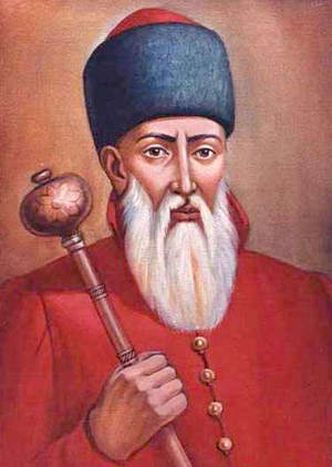
Ukraine: the Way to Independence. Petro Konashevych-Sahaidachny
Published on
Sahaidachny won the greatest victories during all the history of cossacs’ fights with Osman empery. Wise general, good navigator, he got the glory of Svyatoslav the Brave back to the Black sea waters.
One of the European greatest generals of all the times, statesman, first Hetman of Ukraine, who established the statehood of cossacs period, diplomat, highly educated person – such is the portrait of Petro Konashevych Konashevych-Sahaidachny in Ukrainian history.
Russian imperialistic historiographers of all times made everything possible to make this prominent personality “vanish” in the memories, as Sahaidachny was much more educated and wise general, much more weighty and respected figure in Europe , than the Moscovite elite of that time. He was aware yet then that dark, wild imperialistic Moscovia is as terrific enemy of Ukraine, as Tatar horde.
Hetman of Ukrainian registered Cossacks was born in 1570 in the small village called Kul’chitsi in Lviv region. He came out from the family of orthodox gentleman, who even had his own coat of arms. Petro studied in the school of Lviv fraternity and in the famous of that time Ostrozhska school, which had the pure spirit of Cossacs, orthodoxy and liberation struggle.
In 1601 he came to Zaporizhska Sich. He went all the way from simple cossac to hetman, and truly deserved respect from fellow brothers for his sense of justice, sharp mind and exceptional skills of general.
Sahaidachny won the greatest victories during all the history of cossacs’ fights with Osman empery. Wise general, good navigator, he got the glory of Svyatoslav the Brave back to the Black sea waters.
Sahaidachny understood that establishment of the state is the main aim, that is why he chose the wisest tactics of fight against two emperies, which tightened our lands. Against more civilized by the laws Polish-Lithuanian Commonwealth he acted diplomatically, using right moments to implement his thoughts. Such it was in 1618, when the king of Polish-Lithuanian Commonwealth asked hetman Sahaidachny to take part in a campaign against common enemy – Moscovia. After having listened to the king, Sahaidachny put forward such conditions – enlargement of cossacs territory; freedom of orthodox religion in Ukraine; increment of number of registered cossacs army; juridical and administrative recognition of Ukrainian autonomy by Polish-Lithuanian Commonwealth.
The king and the senate agreed on Sahaidachny’s conditions. After that Sahaidachny took his 20 000 army and in August 1618 went to Moscovia all the way through Siversk region. His cossacs bore away Putivl’ and Ryl’sk, Kursk and Elets – together around 20 Moscovian cities. They broke rebellion militia led by Pozharsky and Volkonsky knights, regiments led by Buturlyn – and in September besieged Moscovia together with Polish. Only armistice between Polish and Moscovians saved the latest from complete crack down. It is important to mention that Moscovians were most of all scared of fast, powerful cossacs army, chroniclers’ memories from those times witness.
Wise state-creator, he understood the development of national education and culture – is the basis of any state. He, with all Army of Cossacs became a part of Kyiv brotherhood, at the same time he took it under his protection. Sahaidachny aimed to renew the significance of Kyiv as of orthodox and cultural center, he supported activity of Lavra’s mitropolite Elisey Pletenetsky and the scientists, editors, writers who gathered around Kyiv-Pecherska Lavra’s publishing house.
At 1620, due to his authority, Jerusalem patriarch Pheophan ordained to bishops some of Ukrainian priests, and renewed Kyiv Metropolis.
During the time of his rule, Sahaidachny strengthened Ukrainian Cossacs state to such extent that Polish-Lithuanian Commonwealth behaved with it as with equal, Osmania considered it its most powerful enemy, and wild Moscovia was frightened of.



